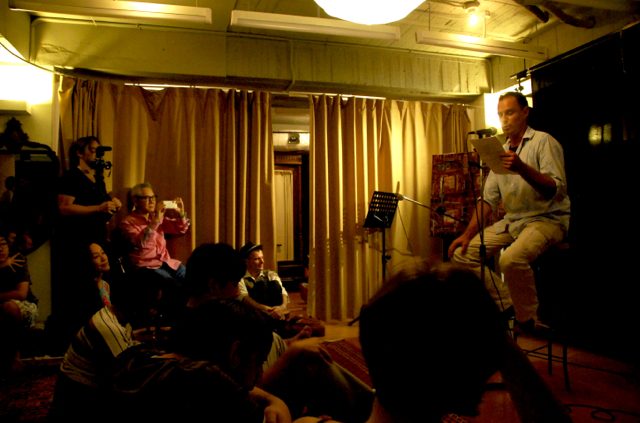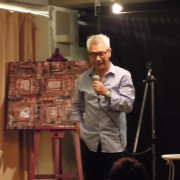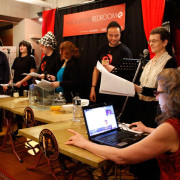Patrick Wayland, April 2012
Nuclear Family Missile
In the 1980’s my father was a senior strategist in Air Force Intelligence. He worked on a secret project to conceal nuclear missiles in the American suburban environment. I grew up with the top half of a Titan II nuclear missile sticking out of my backyard.
The aluminum cylinder rose into the air thirty feet above the cut grass. Rustic wood panel camouflage made the missile appear to be a grain silo, but with the letters U, S, and A down the side. And in the late morning the shadow of the nose cone would crawl across my bedroom floor like the finger of God reminding me of my own mortality. Every morning.
My mother and father were quite liberal in their parenting. They rarely needed to enforce rules or punish me. The monument to mass destruction in my backyard kept me guilt ridden and out of trouble during my early teens. While my friends spent Saturday night vandalizing the school, I was home watching WWII documentaries or reading Edgar Allen Poe or listening to country music. My father only spoke at length to me about two things: winning the war and the mistake Kennedy made by not invading Cuba. Whenever I felt rebellious, I’d stand against the fence on the far side of the yard with my slingshot and shoot rocks at the missile casing. The aluminum shell of the Titan II had a beautiful ring when struck. Tingggg… tingggg… tinggg. It was like the long bell in a Japanese temple surrounded by cherry blossoms, and pine trees, and ponds with those really big goldfish that they have. And then my father would run out the back door – “PATRICK! THE NUCLEAR MISSILE IS NOT A TOY!”
One could say we had three pets: a cat, a dog, and a nuclear missile. It required the same amount of involvement as a pet. I’d have to check the fuel containment twice a week, clean grass-cuttings out of the base seals, and remove leaves from the exhaust vent. The missile’s camouflage often confused our cat. He’d try to sharpen his claws on the fake wood panel. Occasionally he would run, jump, and try to climb the missile, only to slide down, legs pathetically outstretched with that claw-on-metal screech.
At school my classmates and I watched 16mm films about what to do when the attack sirens wailed. Jump into a ditch. Use your desk as cover. Only hide in abandoned refrigerators that don’t lock. But I knew better. At night, I’d covertly looked through my father’s classified damage estimation files as if they were Playboys. My father was patriotic and defiant, and his advice was to run towards the incoming missiles with arms outstretched. “Get it over with,” he’d say with tobacco pipe in hand. “At least we’ll all go down together.” How comforting.
The only thing I remember my parents fighting about was hosting backyard barbeques. Most of the day our backyard was shrouded in the missile’s shadow and my mother hated the inevitable questions about the particulars of grain storage. “Uh, would you like another hotdog?” she would nervously ask to change the subject as if hiding some family infidelity or alcoholism. After my father interrupted the dog urinating on the missile, he would give his standard reply: “It’s the new prairie home look. It’s all the rage in Wyoming.”
Growing up, I learned that telling the truth really had no value when people did not want to believe it. When I told my friends that I had a nuclear missile in my backyard, they just laughed and called me Country-boy. “It’s a nuclear missile,” I’d say. “Whatever, Country-boy,” my friends would yell back. “Country-boy! Country-boy! Why don’t you go thresh some wheat, Country-boy,” one friend would taunt. “Yeah, why don’t you go home and grind some grain into flour meal by removing the bran layer.” (My friends were a little on the nerdy side.)
But now that I’m older and living on my own, I often find myself remembering that shadow of ultimate destruction that crawled across my bedroom floor every morning; after all, it was more than just a nuclear missile. It was the comforting idea that there was some greater force looking out for me. Like a really fat kid who would beat up anyone who bothered me at school. A protector. A friend. Since I moved away from my family and the Cold War ended, I know I’ve lost something… the overshadowing presence of something greater than my own selfish needs. That and the knowledge of mutually assured destruction with my enemies. I have to admit, I miss my family’s nuclear missile.
Patrick Wayland belongs to the Taipei Writer’s Group
https://groups.google.com/forum/?fromgroups#!forum/tpewriters












Leave a Reply
Want to join the discussion?Feel free to contribute!